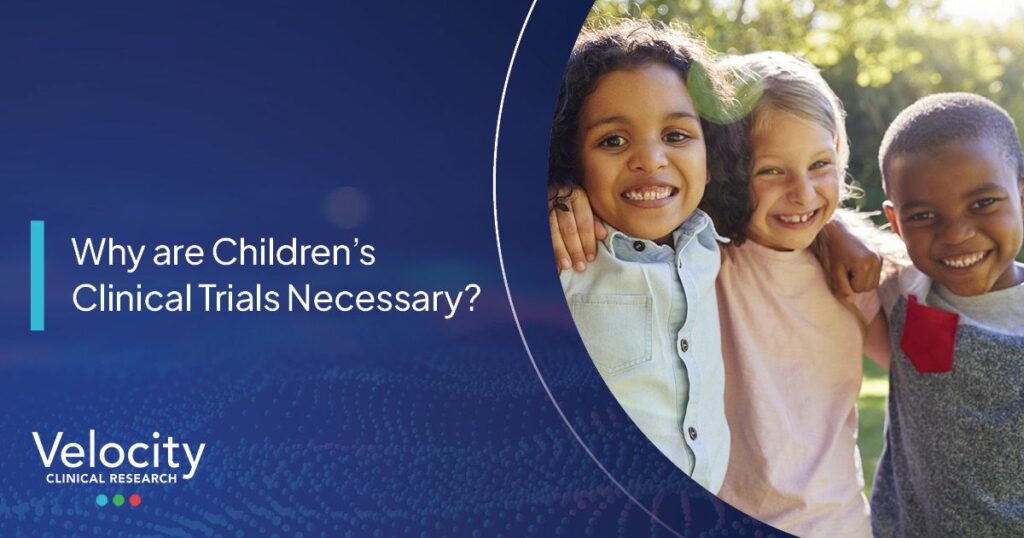Many adults participate in clinical trials each year, but why is it necessary to have children’s clinical trials? Not all medications approved for adults can be ‘dosed down’ to safely work for children. Throughout infancy, childhood, and adolescence, the developing body may react to medications much differently than in adulthood.
Aspirin is an example of a common medication that is not approved for use in children younger than three. Moreover, aspirin can cause severe complications in children and teenagers experiencing fever and/or flu-like symptoms.
That’s why clinical trials are critical to the advancement of children’s medicine.
Which Children’s Products Undergo Clinical Testing?
Clinical trials make it possible for scientists to study the safety and effectiveness of vaccines, medications, medical devices, and treatments created or dosed specifically for children. Yearly flu vaccines for children, kids’ cough medicine, and infant formula are all examples of products that must be undergo clinical testing before being approved for use.
With advances in science, drug developers are uncovering new ways to treat and protect children, even before they’re born. Several pharmaceutical companies are researching vaccinations for pregnant mothers that could protect newborns from dangerous viruses and infections (e.g., respiratory syntactical virus).
About half of all people diagnosed with a rare disease are children. Clinical trials can offer a new care option for children battling a disease that has no approved therapies. Clinical trials can also serve as an alternative care option for patients who don’t respond to therapies currently on the market.
The Benefits of Participating in a Pediatric Clinical Trial
Joining a clinical trial can be a rewarding experience. Children who join studies may:
- Learn about new medicines: As mentioned above, clinical trials can offer more care options for children with common and/or rare health conditions.
- Get expert medical exams and care: The doctors involved in clinical trials are often specialists in the condition(s) being studied. As part of a study, your child may be able to receive certain exams, care, or investigational product(s) at no cost.
- Feel a sense of accomplishment: Your child is helping others and contributing to the advancement of medicine.
The Risks of Participating in a Pediatric Clinical Trial
The ethics and laws that govern medical practice also apply to clinical trials. These trials involve investigational products that could be ineffective or cause side effects. Clinical trials are overseen by the U.S. Food and Drug Administration (FDA). The FDA has an Office of Pediatric Therapeutics that monitors clinical trials involving children.
Clinical trials also follow strict plans called protocols, which are reviewed by institutional review boards (IRBs) to make sure your child’s rights are protected. Every effort is made to ensure your child’s safety during a study.
You should always ask about the potential risks and benefits of joining a study. All clinical trials at Velocity are overseen by physicians and licensed healthcare professionals who can answer your questions.
Your child’s pediatrician can also help you determine if a clinical trial may be right for your child.
Questions to Ask
Participating in a study is an important decision — regardless of the study you’re considering, below are questions you can ask to help make the best decision for your child.
- What’s the goal of this study?
- How will the medicine, medical device, or test be given to my child?
- How many times will I need to bring my child to the clinic for visits?
- Is compensation available for study-related time and travel?
- Is insurance required to join this study?
- If a treatment is effective, can my child continue taking it after the study?
- Will my child receive any exams, tests, or follow-up care?
- Who is the doctor and/or staff running this study?
- How is my child’s privacy protected throughout the study?
- Will the study affect my child’s current treatment plan or daily life?
Velocity partners with physicians and pediatric clinics to conduct clinical studies. For more information about Velocity studies near you, sign up at velocityclinicaltrials.com.

